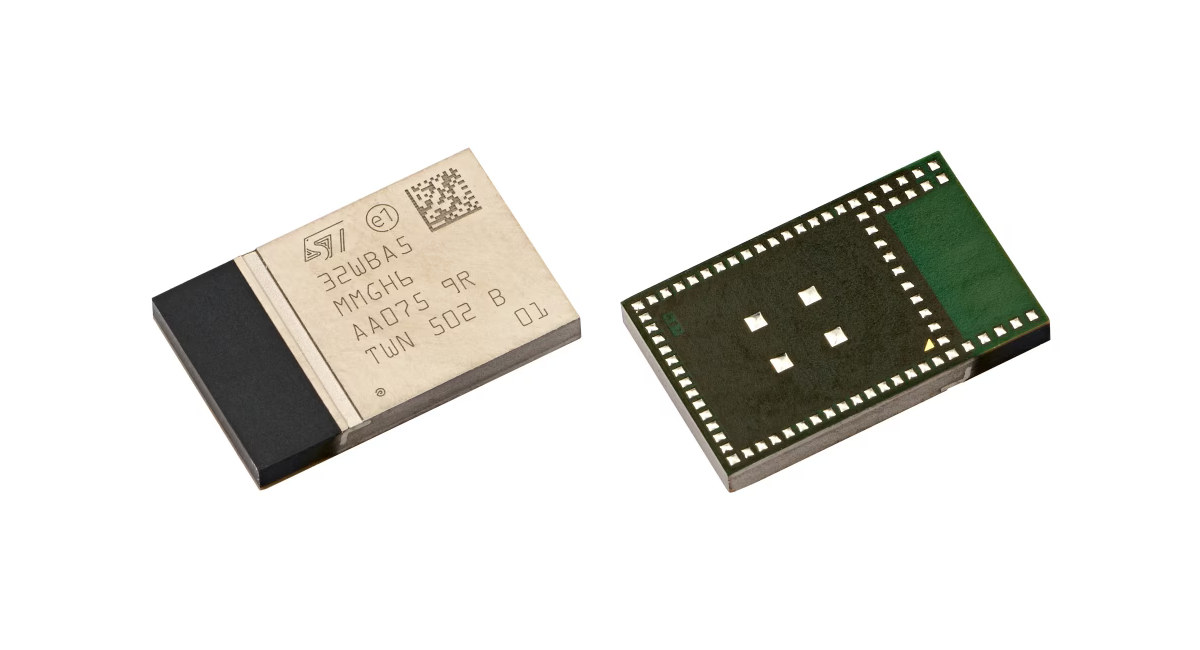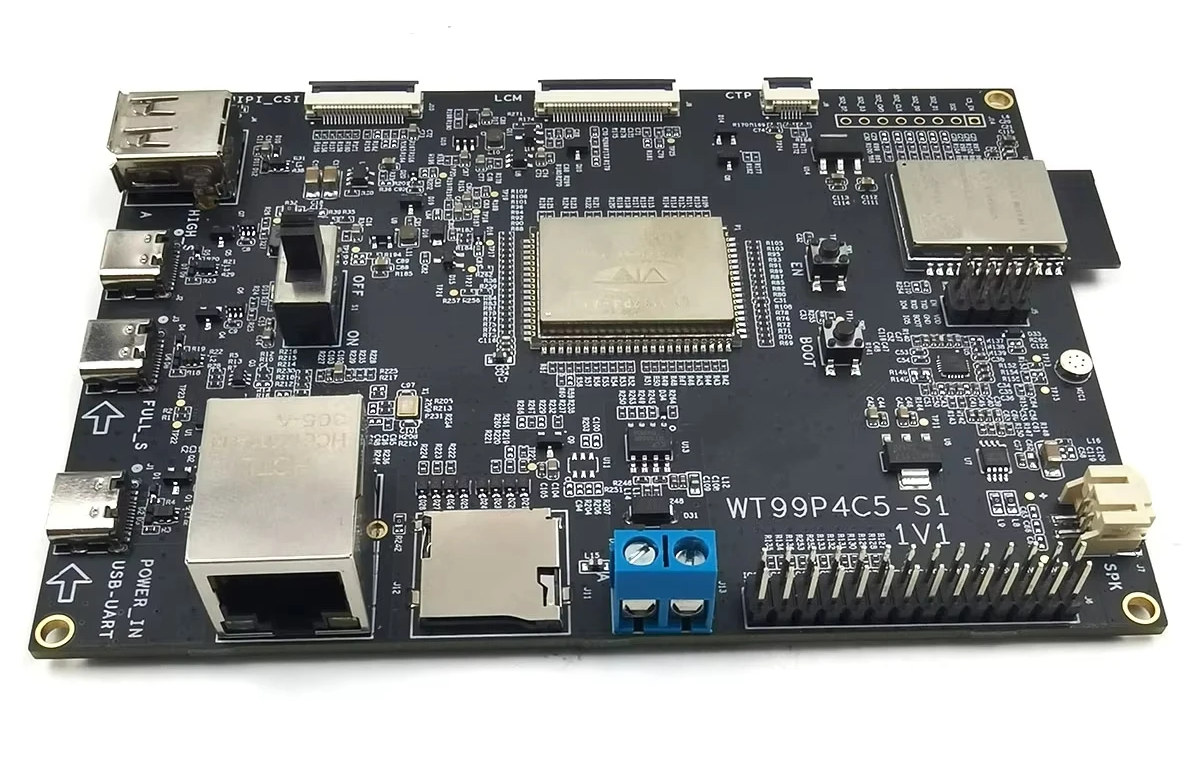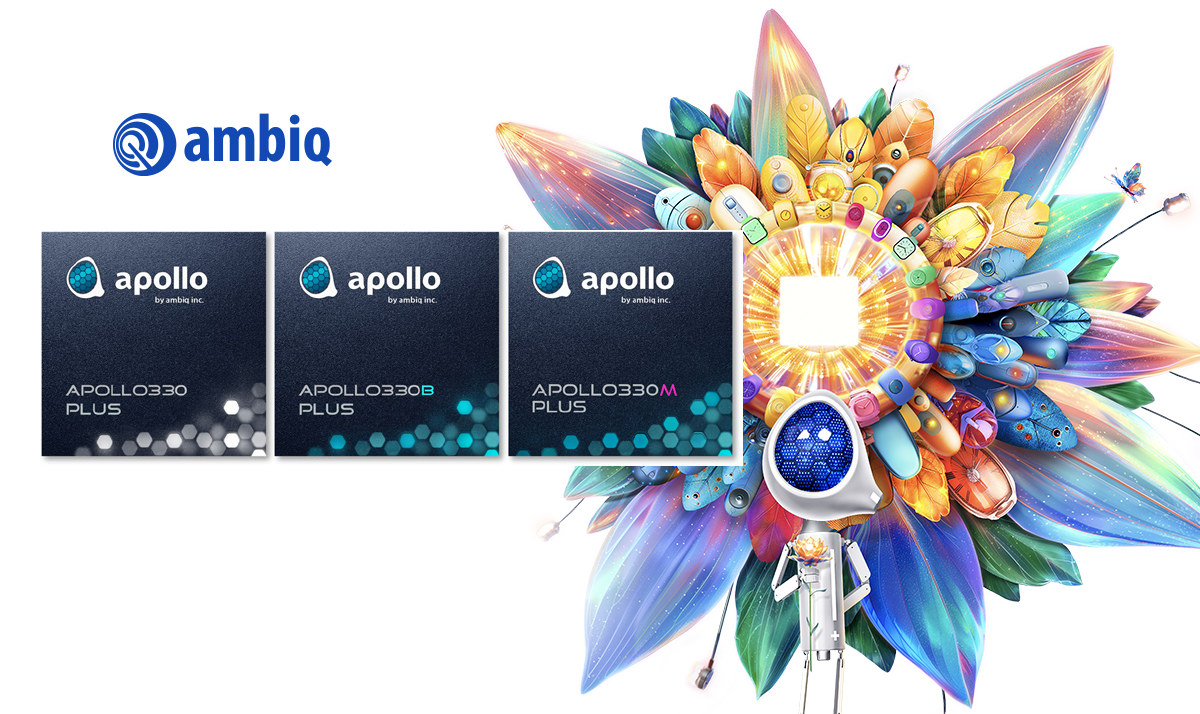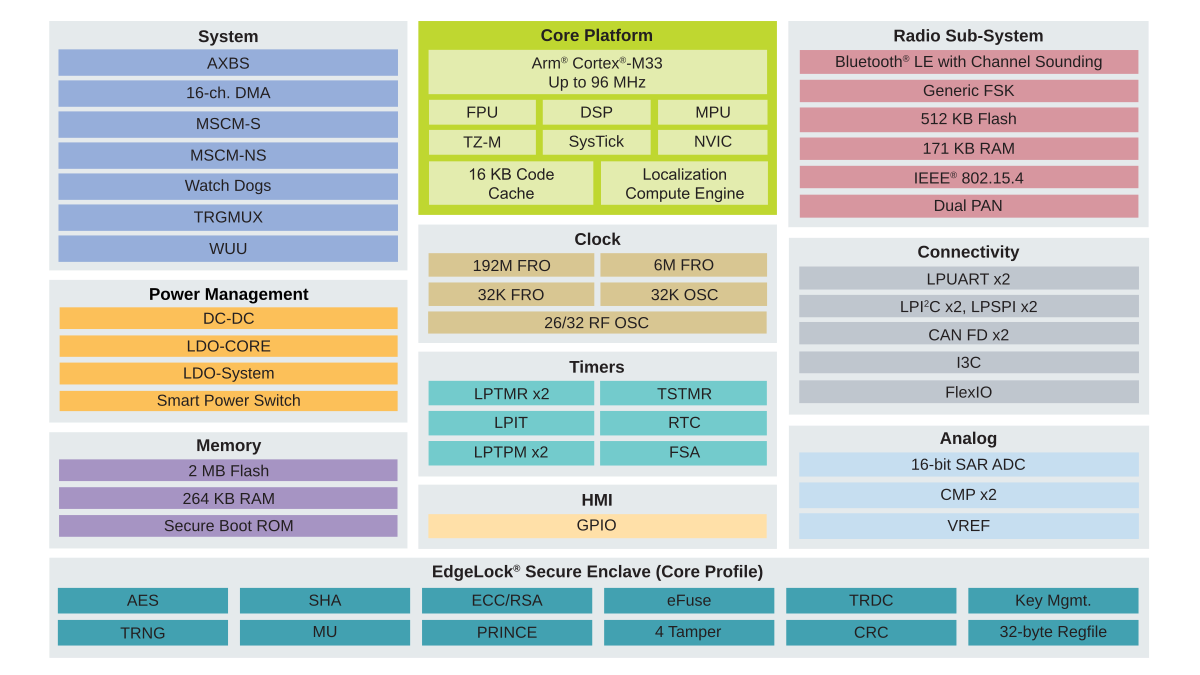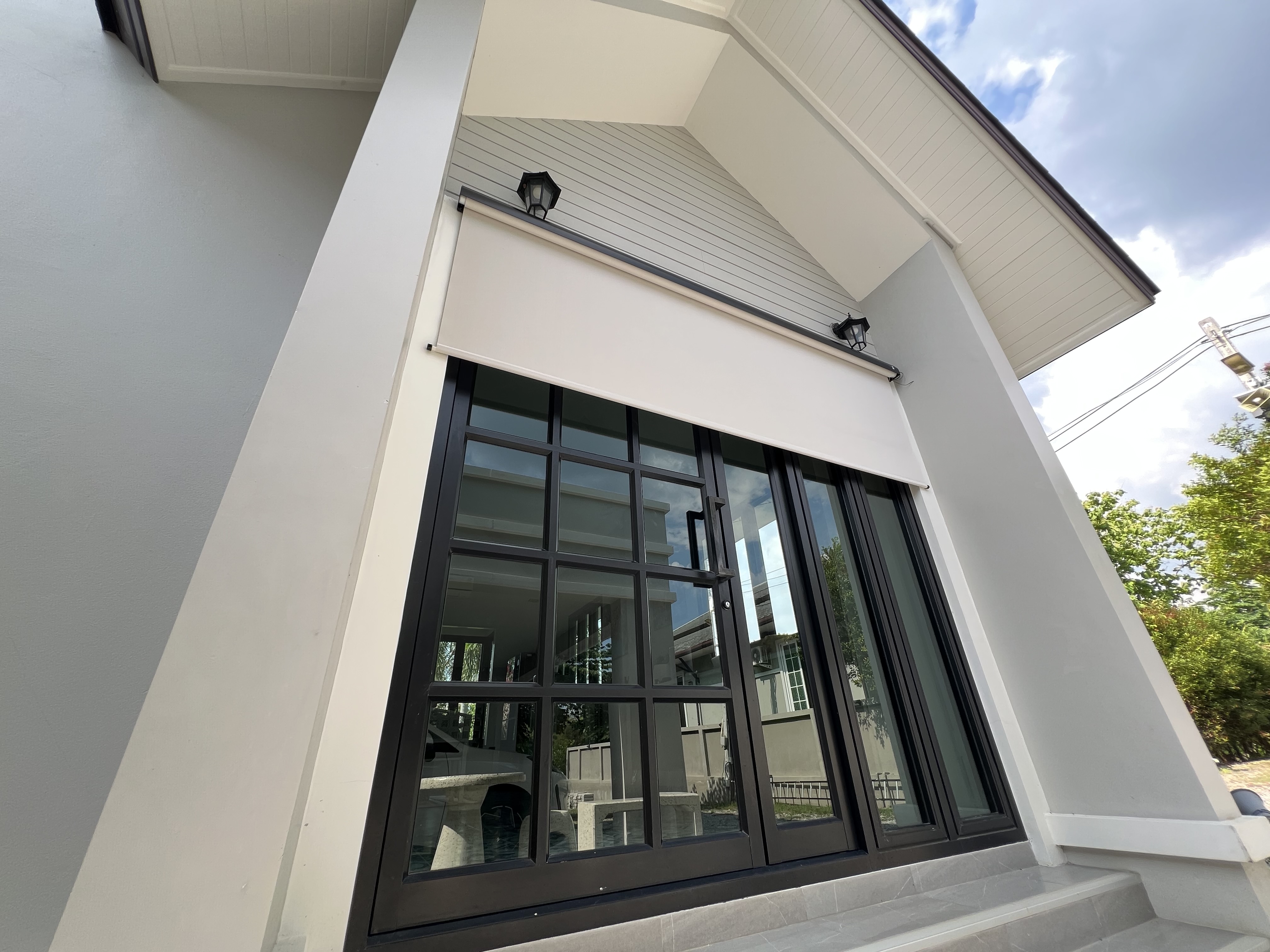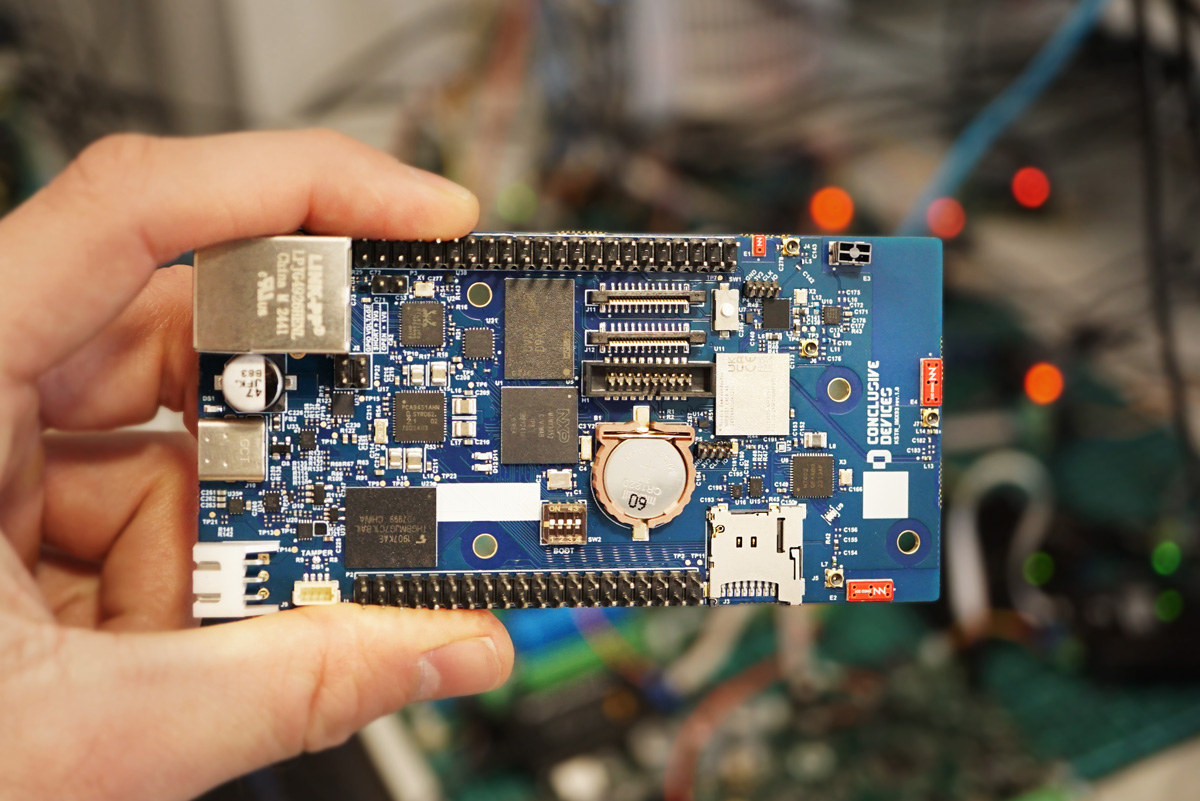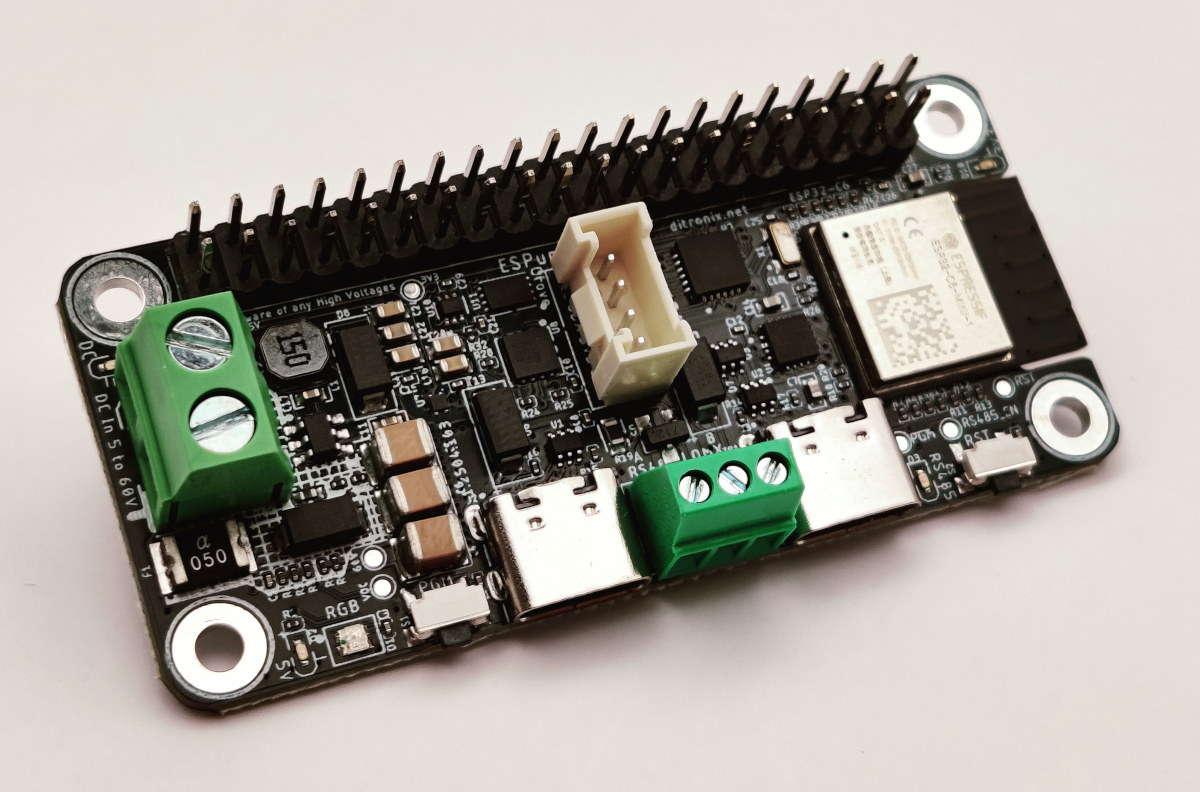STMicro’s STM32WBA5MMG is a tiny (12.5 x 8 mm), ultra-low-power 2.4 GHz wireless module based on the STM32WBA55UG wireless microcontroller with support for Bluetooth 6.0 LE, Zigbee 3.0, and OpenThread. The company further adds that designing a board for the module does not require any RF expertise, it provides a fully integrated Bill of Materials (BOM) with 32 MHz and 32 kHz crystals and integrated antenna matching or optional external antenna configurations, and its compatibility with 2-layer PCBs helps reduce costs. STM32WBA5MMG specifications: Wireless MCU – STMicro STM32WBA55UG Core – 32-bit Arm Cortex-M33 CPU with TrustZone®, MPU, DSP, and FPU Memory – 128 KB SRAM, including 64 KB with parity check Storage 1 MB flash memory with ECC, including 256 KB with 100 kcycles 512-byte (32 rows) OTP ART Accelerator – 8 KB instruction cache allowing 0-wait-state execution from flash memory (frequency up to 100 MHz, 150 DMIPS) Wireless Bluetooth […]
This ESP32-P4 board is equipped with an ESP32-C5 dual-band WiFi 6 module
All ESP32-P4 boards and devkits we’ve covered so far rely on ESP32-C6 for wireless connectivity, but the Wireless Tag WT99P4C5-S1 differs in that it pairs the ESP32-P4 RISC-V SoC with an ESP32-C5 wireless module featuring dual-band WiFi 6, Bluetooth LE 5.0, and an 802.15.4 radio for Zigbee, Thread, and Matter connectivity. The board also features MIPI DSI and CSI connectors for a display and a camera, GPIO headers for the ESP32-P4 and ESP32-C5 modules, a microSD card slot, a Fast Ethernet port, a built-in microphone, a speaker connector, an RS485 terminal block, and a few USB ports for data and debugging. Wireless Tag WT99P4C5-S1 board specifications: Core module – Wireless Tag WT0132P4-A1 SoC – Espressif Systems ESP32-P4 CPU Dual-core 32-bit RISC-V HP (High-performance) CPU @ up to 400 MHz with AI instructions extension and single-precision FPU Single-RISC-V LP (Low-power) MCU core @ up to 40 MHz with 8KB of zero-wait […]
Ambiq Apollo330 Plus SoC Series Cortex-M55 MCU family offers optional Bluetooth 5.4 LE and 802.15.4 radios
Ambiq Apollo330 Plus SoC Series is a new family of ultra-low-power, sub-threshold Arm Cortex-M55 microcontrollers with optional Bluetooth 5.4 LE and 802.15.4 radios for IoT and Smart Home applications. The Ambiq Apollo330 Plus MCU itself appears to be a cost-down version of the Ambiq Apollo510 general-purpose Cortex-M55 MCU introduced last year, with the removal of display and graphics support, lower RAM and NVM capacities (2MB/2MB vs. 3.75MB/4MB), and fewer I/Os, but with a wider 1.71 to 3.63V voltage supply range. Two other SKUs add wireless: the Apollo330B Plus includes a Bluetooth 5.4 LE radio, and the Apollo330M Plus an extra 802.15.4 radio for Zigbee, Thread, and Matter as a multiprotocol SoC. Ambiq Apollo330 Plus specifications: CPU Core – 32-bit Arm Cortex-M55 @ 96 MHz / 250 MHz (turboSPOT) with Helium technology, Network coprocessor Memory- 2MB SRAM Storage 2MB NVM SDIO v3.0 and eMMC flash controllers Wireless Arm Cortex-M4F network processor […]
NXP MCX W72x Cortex-M33 wireless SoC supports Bluetooth 6.0 with Channel Sounding, Zigbee, Thread and Matter
NXP MCX W72x series Cortex-M33 wireless SoCs support for Bluetooth 6.0 and an 802.15.4 radio for Zigbee, Thread, and Matter. The MCX W72x family also implements Bluetooth Channel Sounding for accurate distance measurements with the help of a Localization Compute Engine (LCE) to reduce latency. It’s the second MCU part of the MCX W wireless family following the MCX W71x MCU, and the new MCX W72x wireless microcontroller is offered with up to 264 KB SRAM, 2MB flash, features a dedicated Cortex-M33 core to handle Bluetooth and 802.15.4 radios, implements an EdgeLock Secure Enclave for security, and integrates plenty a range of I/Os in a 48-pin package. NXP MCX W72x key features and specifications: MCU cores and memory/storage Application core – Arm Cortex-M33 core up to 96 MHz with 2 MB program Flash with ECC, 264 kB SRAM with ECC and parity Networking core – Arm Cortex-M33 core with dedicated […]
Silicon Labs SiXG301 and SiXG302 “Series 3” wireless SoCs are built for line-powered and battery-powered IoT applications
Silicon Labs has just introduced the first 22nm Series 3 SoCs with the SiXG301 and SiXG302 Arm Cortex-M33 multiprotocol wireless SoCs designed for line-powered and battery-powered IoT devices, respectively. The SiXG301 is offered with 4MB flash and 512 KB SRAM, embeds an LED pre-driver for advanced LED smart lighting and smart home products, and supports 2.4 GHz wireless protocols such as Bluetooth, Zigbee, and Thread with support for Matter. The upcoming SiXG302 Bluetooth and Matter SoC offers an ultra-low-power consumption using only 15 µA/MHz active current, or 30% lower than competitive devices in its class, and as such is ideal for battery-powered wireless sensors and actuators. We’ll be focusing on the SiMG301 multi-protocol SoC and SiBG301 Bluetooth LE SoC in this article since the details are sparse for the SiXG302 parts (SiMG302 and SiBG302). Silicon Labs SiMG301 / SiBG301 specifications: MCU Core – 32-bit Arm Cortex-M33 with DSP instructions and […]
SmartWings Smart Shade Review – An outdoor, solar-powered Matter shade tested with Apple HomeKit and Home Assistant
Recently, we received a custom-made-to-order smart shade from SmartWings for review. We never heard about SmartWings before, but the company claims to have been in the smart blind/shade and home automation industry for over 15 years. Their standout feature is the high degree of customisation they offer—whether it’s the type of shade, custom size up to almost 3 meters in width and height, various fabric styles, and compatibility with major Smart Home platforms like Amazon Alexa, Google Home, Apple HomeKit, Samsung SmartThings, Home Assistant, and Hubitat. SmartWings asked us to select a location in the house where we wanted to review the smart shade. We wanted to review a solar-powered outdoor shade, so we selected a windowed door with direct sunlight. We carefully measured the dimensions following the instructions on the company’s website to understand the process. We had to select the shade type, privacy level of the fabric (openness), […]
KSTR-IMX93 single board computer pairs NXP i.MX 93 SoC with Nordic Semi nRF5340, nRF9151, and nRF7002 wireless chips
Conclusive Engineering KSTR-IMX93 is a single board computer (SBC) powered by an NXP i.MX 93 Cortex-A55/M33 AI SoC and equipped with three Nordic Semi wireless solutions, namely nRF5340 SoC, nRF9151 SiP, and nRF7002 WiFi 6 coprocessor. This allows the board to offer a wide range of wireless and wired connectivity options with Gigabit Ethernet, dual-band WiFi 6, Bluetooth 5.4 LE, Zigbee, Thread, NB-IoT, LTE Cat-M1, and GNSS. In some way, the KSTR-IMX93 is the equivalent of combining a Nordic Thingy:91 X Cellular IoT development platform with an Arm Linux SBC. KSTR-IMX93 specifications: SoC – NXP i.MX 93 CPU Single or dual-core Arm Cortex-A55 up to 1.7 GHz Arm Cortex-M33 up to 250 MHz GPU – PXP 2D GPU with blending/composition, resize, color space conversion NPU – Arm Ethos-U65 NPU @ 1 GHz up to 0.5 TOPS Memory – 640 KB OCRAM w/ ECC Security – EdgeLock Secure Enclave System Memory […]
ESPuno Pi Zero ESP32-C6 board takes up to 60V DC input, offers RS-485 interface (Crowdfunding)
ESPuno Pi Zero is a Raspberry Pi Zero-sized board based on an ESP32-C6-MINI-1 WiFI 6, BLE, and 802.15.4 wireless module and an SMPS that allows up to 60V DC input via a 2-pin terminal block. The board also features two USB-C ports, one connected to the ESP32-C6 and the other to a CH343P USB-to-serial chip, a 40-pin GPIO header, a Grove connector, a 3-pin terminal block for RS-485, DMX, Profibus, and a few buttons and LEDs. ESPuno Pi Zero specifications: ESP32-C6-MINI-1-N4 or ESP32-C6-MINI-1U-N4 SoC – Espressif Systems ESP32-C6 single-core 32-bit RISC-V clocked up to 160 MHz 320KB ROM, 512KB SRAM, low-power RISC-V core @ up to 20 MHz CPU Single-core 32-bit RISC-V clocked up to 160 MHz Low-power RISC-V core @ up to 20 MHz Memory/Storage – 320KB ROM, 512KB SRAM Wireless – 2.4 GHz WiFi 6, Bluetooth 5.0, and 802.15.4 radio (for Thread/Zigbee) Storage – 4MB flash Antenna ESP32-C6-MINI-1-N4 […]


